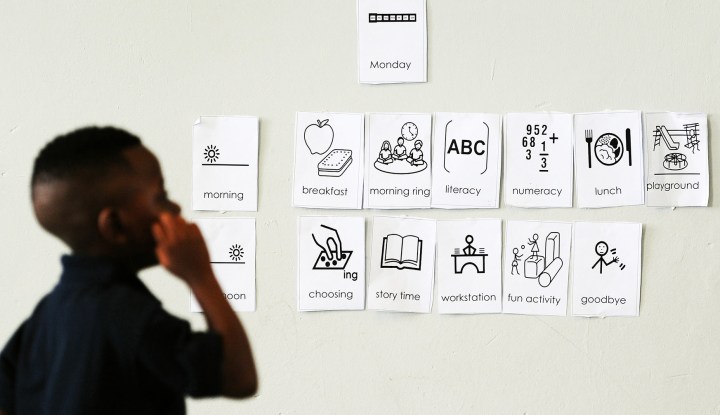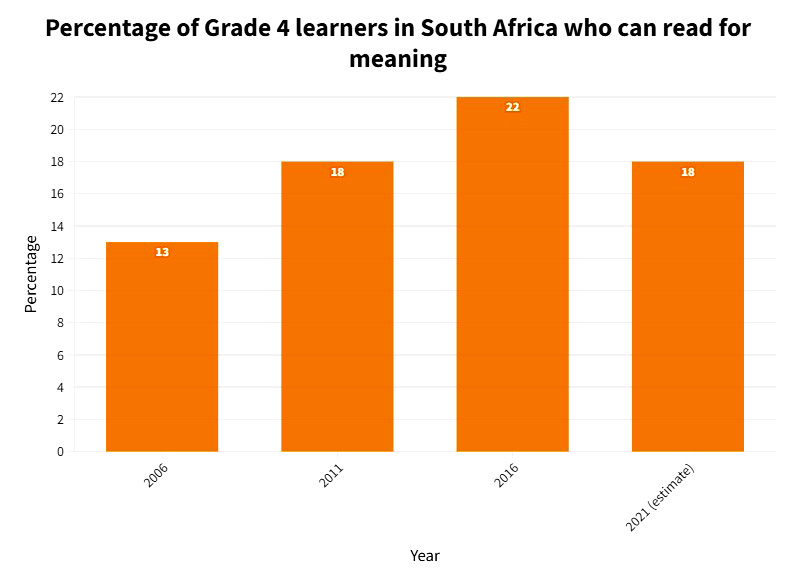2030 READING PANEL FINDINGS
Still no national plan to address SA’s reading crisis as percentage of children who can read for meaning declines

There is a real possibility that a decade of progress in reading outcomes was lost during the Covid-19 pandemic. The 2023 Reading Panel report paints a picture of a country in the grips of a reading crisis, with no national plan on how to break free.
The end is nowhere in sight for South Africa’s reading crisis. New estimates of learning losses incurred during the Covid-19 pandemic show that the country has lost significant ground in the battle to ensure all children can read for meaning.
The “2023 Reading Panel Background Report” puts the percentage of Grade 4 children who cannot read for meaning in any language at 82%, compared to 78% pre-pandemic. The new estimate is based on research conducted in 2021, which saw all Grade 3 and Grade 6 learners in the Western Cape tested in language.
“When it comes to reading, we need massive investment so that we can break the back of the problem as we have it today,” said Dr Phumzile Mlambo-Ngcuka, chairperson of the 2030 Reading Panel. “We must make sure that we invest for the long term… we know that at this point we are in a critical situation.”

(Source: 2023 Reading Panel Background Report; Progress in International Reading Literacy Study (Pirls) data)
Mlambo-Ngcuka was speaking at the 2023 conference of the 2030 Reading Panel on Tuesday, 7 February. The event was attended by more than 100 delegates representing 60 organisations from business, civil society, academia and the education sector.
If South Africa maintains a pre-pandemic improvement trajectory from the current estimate of Grade 4 reading outcomes, it will take 86 years to reach a point where 95% of children can read for meaning, according to the reading panel report. The year will be 2108.
“If we wanted to have some significant improvement in that number, there would need to be significant reforms,” said Nic Spaull, secretary of the 2030 Reading Panel and associate professor of economics at Stellenbosch University.
“We listed things like fundamental reforms around the way that teachers are recruited, the way that they’re trained, the way that they’re certified… how education is financed, and also the resourcing of schools. None of those things are possible without tackling the politics that’s involved in South African education.”
The “wheels are coming off” as early as Grade 1 and 2 when it comes to reading ability, according to Spaull. Analysis of new datasets from over 40,000 South African learners showed that less than 50% of children had learned the letters of the alphabet by the end of Grade 1.
These children are left perpetually behind and in “catch-up mode”, though they never actually catch up, according to the report.

Dr Phumzile Mlambo-Ngcuka, chairperson of the 2030 Reading Panel, said that massive investment was needed to improve reading outcomes for South Africa’s children. (Photo: Alexa Sedgwick)
Funding a ‘reading plan’
The reading panel report shows that only two South African provinces have implemented province-wide, funded interventions targeting reading in the early grades — Gauteng and the Western Cape.
The Western Cape Education Department has partnered with nonprofit Funda Wande to implement a “Reading for Meaning” programme in the province’s Afrikaans and isiXhosa schools between 2023 and 2025. The three-year project has an R111-million budget and will impact learners in grades 1 to 3.
Visit Daily Maverick’s home page for more news, analysis and investigations
The Gauteng Department of Education has partnered with nonprofit WordWorks to provide a Grade R reading programme in all schools offering this grade between 2022 and 2024. A consortium of donors funded 80% of the project’s R107-million budget.
There remains no national reading plan or national budget allocated to reading interventions, according to the report. The only exceptions are the national rollout of Department of Basic Education (DBE) workbooks and the Presidential Youth Employment Initiative (PYEI) Educator Assistants programme. About 10% of the 2023 cohort of PYEI educator assistants have been allocated as “Reading Champions”.
The problem of poor reading outcomes is not rooted in a lack of budget for the DBE, but rather a failure to produce value on the investment, according to Michael Sachs, adjunct professor at the Southern Centre for Inequality Studies at the University of the Witwatersrand.
“It’s not hard to budget for things. What is hard is to get political will and leadership to… execute the plan,” he said.
Noncedo Madubedube, general secretary of Equal Education, described the situation in the education system as a “polycrisis”.
“There isn’t any line item in the Basic Education Department’s budget that talks about reading specifically,” she said.
“We need a reading programme… at a systemic level that can deal with the crisis in the immediate. What we want to ask from the Department of Education, both at a provincial level and at the national level, is to show us this plan.
“We need to help each other become watchdogs in supporting government… to spend money effectively and efficiently.”
Jonathan Jansen, distinguished professor of education at Stellenbosch University, said that change was not going to come from the top, nor the bottom, but from “the middle” — provincial politicians, private sector stakeholders and local universities.
“The downside of change from the middle, the trade-off, is you’re not going to get systemic change… but at the very least, and in the meantime, you get three or four provinces on board,” he said.
The Reading Panel needed to make a “compelling argument in the public square” for the prioritisation of reading outcomes, Jansen told the conference.
“If you’re going to change [things] then you’re going to have to start convincing people… that this is a priority,” he said.
“With every generation of kids that goes through a 12-year cycle, we are losing big time, not only in terms of the economic cost but the human cost… so, we need a reading panel with teeth.”
Panel recommendations
The 2030 Reading Panel found that almost no progress had been made with regard to the recommendations in the “2022 Reading Panel Background Report”. The 2023 report reiterated the four recommendations from last year and added two:
- Measure what matters by implementing a universal standardised assessment of reading at the primary school level;
- Move from slogans to budgets by allocating meaningful funds to reading resources and interventions;
- Provide a minimum set of reading resources to all Foundation Phase classrooms as a matter of urgency;
- Conduct a university audit of pre-service teacher education programmes;
- Publish a national reading plan and budget for its implementation; and
- Improve the implementation of the Presidential Youth Employment Initiative. DM/MC





















 Become an Insider
Become an Insider
Comments - Please login in order to comment.